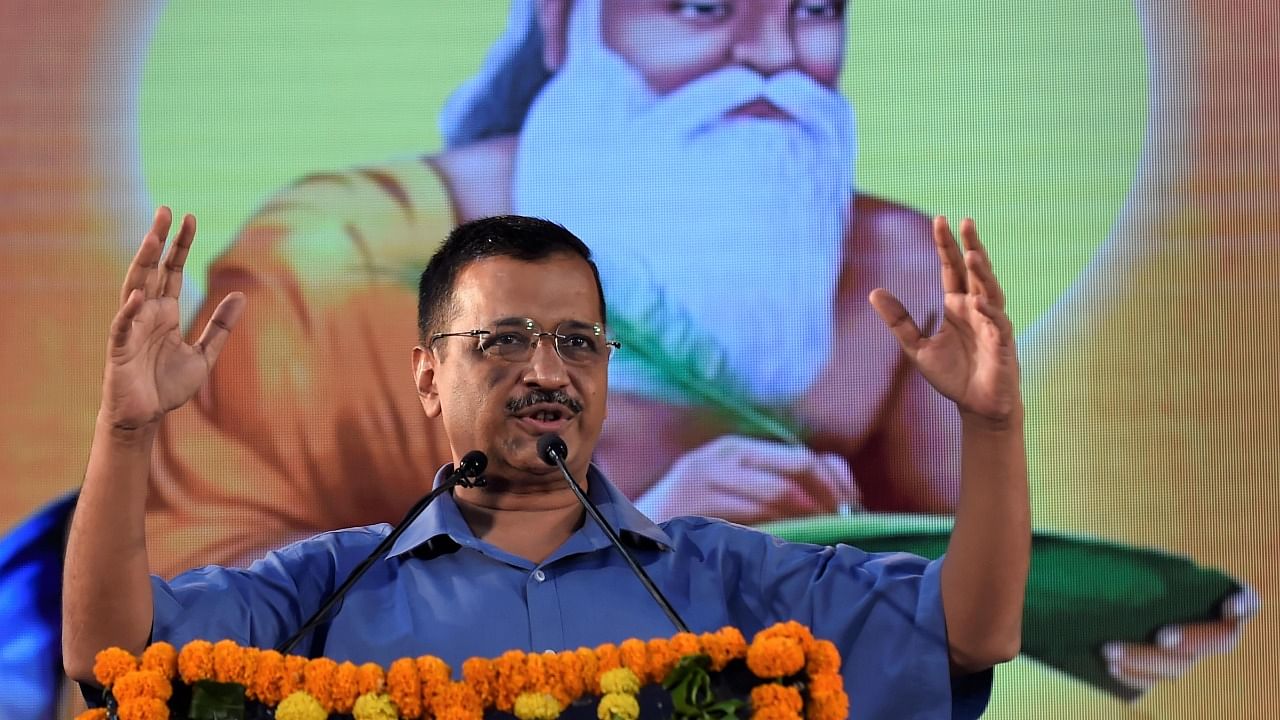
Delhi Chief Minister Arvind Kejriwal must be the best student that Prime Minister Narendra Modi never had. His Aam Adami Party (AAP) and him have learned better how to deal the religious card without appearing openly communal. His communal politics comes packaged with rounded edges.
His demonstrations of routine religiosity become more and more public before elections, whether it is his assertions to being a Hanuman bhakt and recitations of the Hanuman Chalisa or his Diwali tamashas over the last two years. It is a clever position that allows him to appear less strident than the Bharatiya Janata Party (BJP), and it plays on the message that one can be a good Hindu without being communal. However, his political practice shows that being a devout Hindu does not make Kejriwal secular.
Last year, in the midst of the Covid-19 pandemic, Kejriwal organised a televised Lakshmi Puja (worship) at Delhi's Akshardham Temple with family and cabinet in tow. This year taxpayers' money was spent raising a 60-feet tall and 110-feet wide Thermocol and plywood model of a Ram temple at the Thyagaraj Stadium in the national capital. The saffron-roofed temple representing the Ram Mandir under construction in Ayodhya became the site of a televised Lakshmi Puja, performed by Delhi's chief minister with cabinet members and their families. It was accompanied by a glitzy sound and light show with LED displays of scenes from the Ramayana, dances and devotional songs.
In keeping with Covid protocol, the Delhi chief minister kept the public out of the structural fire hazard but televised his devotion for the benefit of Delhiites and others. His government bought ad spots on the radio where he urged residents of Delhi to join him in the state-sponsored worship of Lakshmi and to receive the blessing of "Lord Ram". Stealing what has become the BJP's battle cry, he signed off with a "Jai Shri Ram".
It is straining credulity to separate Kejriwal's Diwali tamasha from a political strategy to use the religious polarisation among voters created by the BJP for himself. It is manifest in his underwriting religious pilgrimage to voters in election-going states. Having already used public money to ferry Delhi's elderly on Hindu pilgrimages, he has now promised similar largesse to voters in Goa, where his party wants to bid for power in the Assembly elections in February 2022. In Delhi, the free pilgrimage was largely for Hindus (to several shrines) and one pilgrimage circuit each for Sikhs (Anandpur Sahib) and Muslims (Ajmer Sharif).
In Goa, this poll strategy comes with a nod to minorities. Although 66 per cent of Goa's population is Hindu, there are 25 per cent Christians (almost all Catholics) and 8.33 per cent Muslims. Therefore, Christians have been offered a free ride to the Basilica of Our Lady of Good Health at Velankanni, in Tamil Nadu and Muslims to Ajmer Sharif, in Rajasthan.
Gujarat, where Kejriwal also tried to make an entry, had three pilgrim sites included in his scheme – Somnath, Dwarka and Nageshwar Jyotirlinga. In Uttarakhand, where he has already announced the AAP's chief ministerial candidate, free pilgrimage is promised from Delhi to Rishikesh, Haridwar and Neelkanth Temple. With an eye on the UP elections, Ayodhya has been added to Mathura and Vrindavan, with the tourist sites of Agra and Fatehpur Sikri thrown in for good measure.
Kejriwal's interpretation of secularism is to promote religiosity in public life – with an eye on the vote of the majority community - through state patronage. In his early days as the chief minister of Delhi, he used to say: "Communalism is a bigger problem than corruption. Corruption only results in loss of money, but due to communalism, people lose their lives and families are shattered."
However, his politics and governance have since both failed the test of secularism. As chief minister, he refused to visit the anti-CAA (Citizenship Amendment Act) protesters at the iconic Shaheen Bagh. He refused to intervene or even make a statement of support when students were beaten up inside the campuses of Jamia Millia Islamia and Jawaharlal Nehru University. Defending his inaction, he said, "Law and order in Delhi come under the Union government, and it was the primary responsibility of the Union Home Minister Amit Shah. I could not have done anything by physically going there." Kejriwal's refusal to intervene in the religiously polarised riots in Northeast Delhi in February-March 2020 or the rehabilitation of the riot-affected, however, was the worst form of acquiescence with majoritarian aggression.
Kejriwal has openly colluded with the Centre's machinations to marginalise and criminalise secular voices. His government gave permission to try Kanhaiya Kumar, Umar Khalid and Anirban Das for charges of sedition, which were entirely political. He did this apparently against the advice of the legal officers in his government. His party also maintained strategic silence when videos surfaced of stridently anti-Muslim slogans being chanted at a Jantar Mantar protest, which even an embarrassed BJP had to distance itself from.
What then is the game plan that Kejriwal is working on? He consciously toasts Hinduism, identifies with it and puts his state machinery behind organising mega-pujas and worships of Hindu festivals. His pandering to the majority is given the veneer of secular politics by throwing a few crumbs to the minorities. While it helps him draw away a voter base created by the majoritarian policies of the BJP, his Hindu communalism comes packaged as religious devotion.
Arvind Kejriwal's "stealth communalism" is thus able to fly under the communal radar with state organised religious festivals providing him with the "cloud cover" (to quote another Great Leader) to undertake a political strike.
(The writer is a journalist based in Delhi)
Disclaimer: The views expressed above are the author's own. They do not necessarily reflect the views of DH.